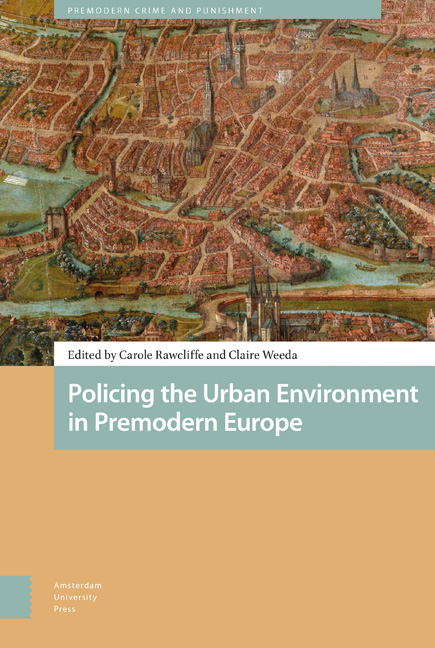Book contents
- Frontmatter
- Contents
- List of Illustrations
- List of Figures and Charts
- Introduction
- 1 Cleanliness, Civility, and the City in Medieval Ideals and Scripts
- 2 The View from the Streets: The Records of Hundred and Leet Courts as a Source for Sanitary Policing in Late Medieval English Towns
- 3 Urban Viarii and the Prosecution of Public Health Offenders in Late Medieval Italy
- 4 Food Offenders: Public Health and the Marketplace in the Late Medieval Low Countries
- 5 Policing the Environment of Late Medieval Dordrecht
- 6 Muddy Waters in Medieval Montpellier
- 7 Regulating Water Sources in the Towns and Cities of Late Medieval Normandy
- 8 Policing the Environment in Premodern Imperial Cities and Towns: A Preliminary Approach
- 9 Official Objectives of theVisitatio Leprosorum: Ambiguity, Ambivalence, and Variance
- Index
4 - Food Offenders: Public Health and the Marketplace in the Late Medieval Low Countries
Published online by Cambridge University Press: 21 November 2020
- Frontmatter
- Contents
- List of Illustrations
- List of Figures and Charts
- Introduction
- 1 Cleanliness, Civility, and the City in Medieval Ideals and Scripts
- 2 The View from the Streets: The Records of Hundred and Leet Courts as a Source for Sanitary Policing in Late Medieval English Towns
- 3 Urban Viarii and the Prosecution of Public Health Offenders in Late Medieval Italy
- 4 Food Offenders: Public Health and the Marketplace in the Late Medieval Low Countries
- 5 Policing the Environment of Late Medieval Dordrecht
- 6 Muddy Waters in Medieval Montpellier
- 7 Regulating Water Sources in the Towns and Cities of Late Medieval Normandy
- 8 Policing the Environment in Premodern Imperial Cities and Towns: A Preliminary Approach
- 9 Official Objectives of theVisitatio Leprosorum: Ambiguity, Ambivalence, and Variance
- Index
Summary
Abstract
In the Low Countries, market squares were the site of numerous threats to public health and efforts to contain them, notably by the officials who inspected, guarded, and protected these spaces. This chapter explores the ways in which urban authorities and other corporate bodies attempted to police markets, and improve levels of sanitation, environmental health, and food safety. It utilizes archival material from several Netherlandish cities, including financial records and public decrees, bylaws, and the statutes of trade and craft guilds (which furnish important evidence about the ways in which medical theories informed attitudes to food standards). An analysis of registered fines and information about the punishment of offenders highlights the tensions that existed between customers, vendors, guilds, and magistrates.
Key words: public health; food trade; markets; Low Countries; butchering
In 1476, the urban authorities of Leiden punished three men who had attempted to sell meat from a cow they had bought and slaughtered in nearby Wassenaar. As a result, Leiden's market supervisors had been unable to inspect the animal alive, and therefore:
[N]o one knew if it had died by itself or had any deficiencies or nasty diseases that would have rendered the meat unsuitable for consumption or use. This is an evil, nasty, and unseemly matter, which could have badly affected many people, and which the magistrates will tolerate from no one.
The accused not only had to pay a fine for their transgression, but were also required to redeem themselves through a ritual penance, namely to present a two-pound wax cow in each of the city's three parish churches on the following Sunday. We shall return later to this remarkable act of atonement, but might note here that, in addition to the magistrates’ strongly worded rhetoric in their denunciation of the crime, such a humiliating public spectacle would have gravely undermined the reputation of those involved.
- Type
- Chapter
- Information
- Policing the Urban Environment in Premodern Europe , pp. 121 - 148Publisher: Amsterdam University PressPrint publication year: 2019



